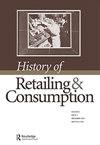Rotting from the inside: the decline of retail guilds in Portugal, 1755–1833
Q2 Arts and Humanities
引用次数: 0
Abstract
ABSTRACT The end of early modern professional guilds is attributed to inherent inefficiencies (an incapacity to solve economic problems) or to state intervention. Governments became powerful enough to dispense the financial support of the guilds and put an end to their privileges and monopolies. This is the dominant view within Portuguese scholarship, especially in relation to craftsmen and artesans. This article focusses, however, on retailing guilds and their internal developments, arguing that the individual disruptive behavior of many Portuguese shopkeepers was as damaging to the corporative structure as was any sort of state policy. At the same time, it also argues that the corporative crisis did not extend to the economic sector itself. In fact, while the guild framework was crumbling, Portuguese retail businesses seemed to persist and prosper. Finally, the article argues that this prosperity was linked to broader changes in fashion and material culture taking place throughout Europe.从内部腐烂:葡萄牙零售行会的衰落,1755-1833
早期现代职业行会的终结被归因于固有的低效率(无法解决经济问题)或国家干预。政府变得足够强大,可以分配行会的财政支持,并结束他们的特权和垄断。这是葡萄牙学术界的主流观点,特别是在工匠和工匠方面。然而,本文的重点是零售业行会及其内部发展,认为许多葡萄牙店主的个人破坏性行为对公司结构的破坏程度不亚于任何一种国家政策。与此同时,它还认为,企业危机并没有蔓延到经济部门本身。事实上,当行会框架崩溃时,葡萄牙的零售业却似乎持续存在并繁荣发展。最后,文章认为,这种繁荣与整个欧洲发生的时尚和物质文化的广泛变化有关。
本文章由计算机程序翻译,如有差异,请以英文原文为准。
求助全文
约1分钟内获得全文
求助全文
来源期刊

History of Retailing and Consumption
Arts and Humanities-History
CiteScore
0.50
自引率
0.00%
发文量
3
 求助内容:
求助内容: 应助结果提醒方式:
应助结果提醒方式:


